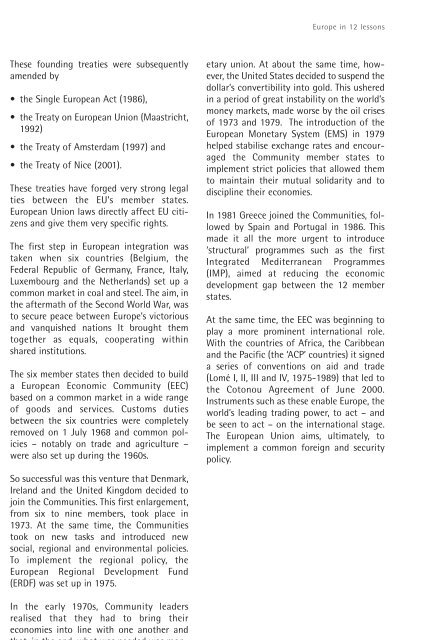Europe in 12 lessons (PDF)
Europe in 12 lessons (PDF)
Europe in 12 lessons (PDF)
Create successful ePaper yourself
Turn your PDF publications into a flip-book with our unique Google optimized e-Paper software.
<strong>Europe</strong> <strong>in</strong> <strong>12</strong> <strong>lessons</strong><br />
These found<strong>in</strong>g treaties were subsequently<br />
amended by<br />
• the S<strong>in</strong>gle <strong>Europe</strong>an Act (1986),<br />
• the Treaty on <strong>Europe</strong>an Union (Maastricht,<br />
1992)<br />
• the Treaty of Amsterdam (1997) and<br />
• the Treaty of Nice (2001).<br />
These treaties have forged very strong legal<br />
ties between the EU’s member states.<br />
<strong>Europe</strong>an Union laws directly affect EU citizens<br />
and give them very specific rights.<br />
The first step <strong>in</strong> <strong>Europe</strong>an <strong>in</strong>tegration was<br />
taken when six countries (Belgium, the<br />
Federal Republic of Germany, France, Italy,<br />
Luxembourg and the Netherlands) set up a<br />
common market <strong>in</strong> coal and steel. The aim, <strong>in</strong><br />
the aftermath of the Second World War, was<br />
to secure peace between <strong>Europe</strong>’s victorious<br />
and vanquished nations It brought them<br />
together as equals, cooperat<strong>in</strong>g with<strong>in</strong><br />
shared <strong>in</strong>stitutions.<br />
The six member states then decided to build<br />
a <strong>Europe</strong>an Economic Community (EEC)<br />
based on a common market <strong>in</strong> a wide range<br />
of goods and services. Customs duties<br />
between the six countries were completely<br />
removed on 1 July 1968 and common policies<br />
– notably on trade and agriculture –<br />
were also set up dur<strong>in</strong>g the 1960s.<br />
In the early 1970s, Community leaders<br />
realised that they had to br<strong>in</strong>g their<br />
economies <strong>in</strong>to l<strong>in</strong>e with one another and<br />
that, <strong>in</strong> the end, what was needed was monetary<br />
union. At about the same time, however,<br />
the United States decided to suspend the<br />
dollar’s convertibility <strong>in</strong>to gold. This ushered<br />
<strong>in</strong> a period of great <strong>in</strong>stability on the world’s<br />
money markets, made worse by the oil crises<br />
of 1973 and 1979. The <strong>in</strong>troduction of the<br />
<strong>Europe</strong>an Monetary System (EMS) <strong>in</strong> 1979<br />
helped stabilise exchange rates and encouraged<br />
the Community member states to<br />
implement strict policies that allowed them<br />
to ma<strong>in</strong>ta<strong>in</strong> their mutual solidarity and to<br />
discipl<strong>in</strong>e their economies.<br />
In 1981 Greece jo<strong>in</strong>ed the Communities, followed<br />
by Spa<strong>in</strong> and Portugal <strong>in</strong> 1986. This<br />
made it all the more urgent to <strong>in</strong>troduce<br />
‘structural’ programmes such as the first<br />
Integrated Mediterranean Programmes<br />
(IMP), aimed at reduc<strong>in</strong>g the economic<br />
development gap between the <strong>12</strong> member<br />
states.<br />
At the same time, the EEC was beg<strong>in</strong>n<strong>in</strong>g to<br />
play a more prom<strong>in</strong>ent <strong>in</strong>ternational role.<br />
With the countries of Africa, the Caribbean<br />
and the Pacific (the ‘ACP’ countries) it signed<br />
a series of conventions on aid and trade<br />
(Lomé I, II, III and IV, 1975-1989) that led to<br />
the Cotonou Agreement of June 2000.<br />
Instruments such as these enable <strong>Europe</strong>, the<br />
world’s lead<strong>in</strong>g trad<strong>in</strong>g power, to act – and<br />
be seen to act – on the <strong>in</strong>ternational stage.<br />
The <strong>Europe</strong>an Union aims, ultimately, to<br />
implement a common foreign and security<br />
policy.<br />
So successful was this venture that Denmark,<br />
Ireland and the United K<strong>in</strong>gdom decided to<br />
jo<strong>in</strong> the Communities. This first enlargement,<br />
from six to n<strong>in</strong>e members, took place <strong>in</strong><br />
1973. At the same time, the Communities<br />
took on new tasks and <strong>in</strong>troduced new<br />
social, regional and environmental policies.<br />
To implement the regional policy, the<br />
<strong>Europe</strong>an Regional Development Fund<br />
(ERDF) was set up <strong>in</strong> 1975.<br />
8







